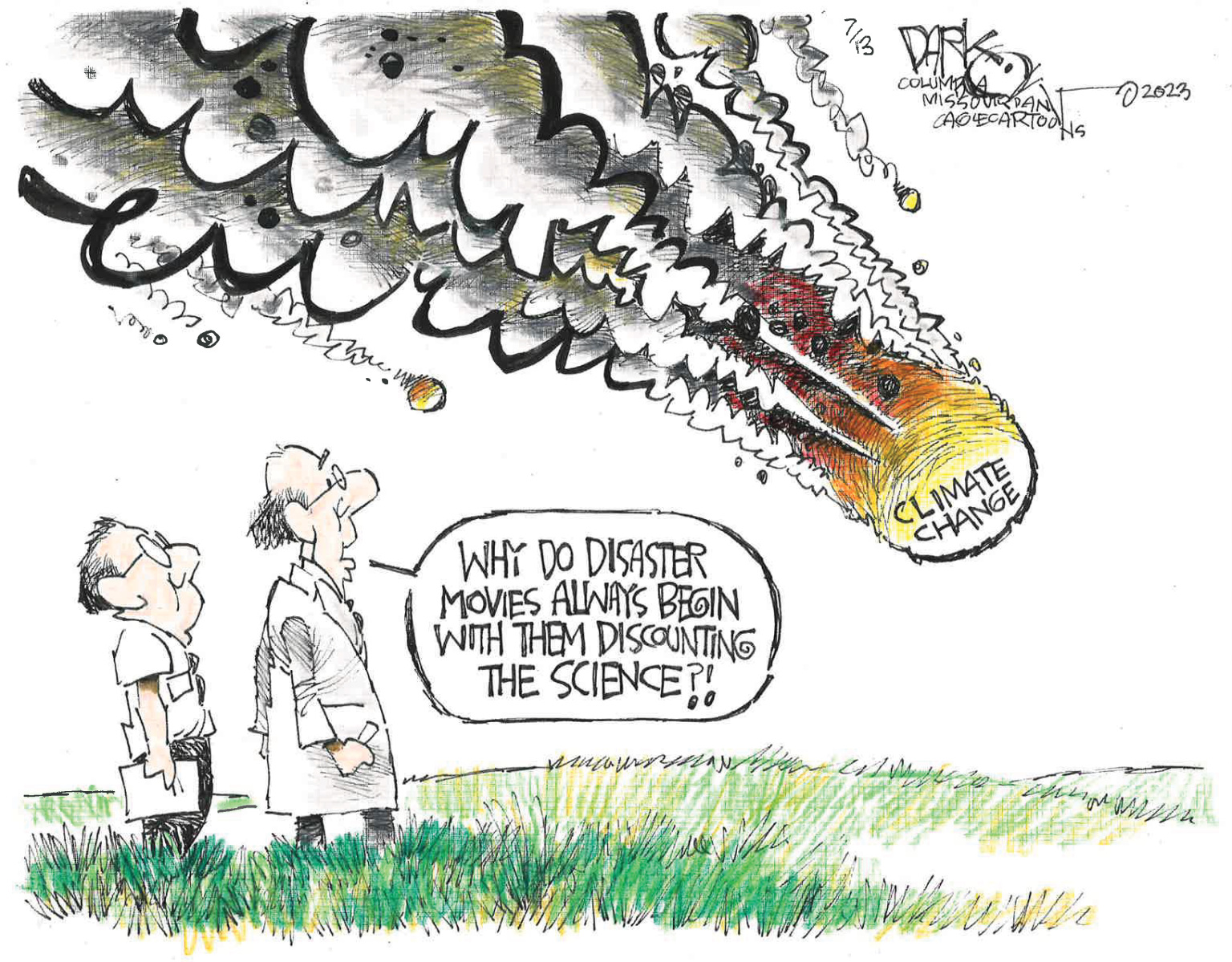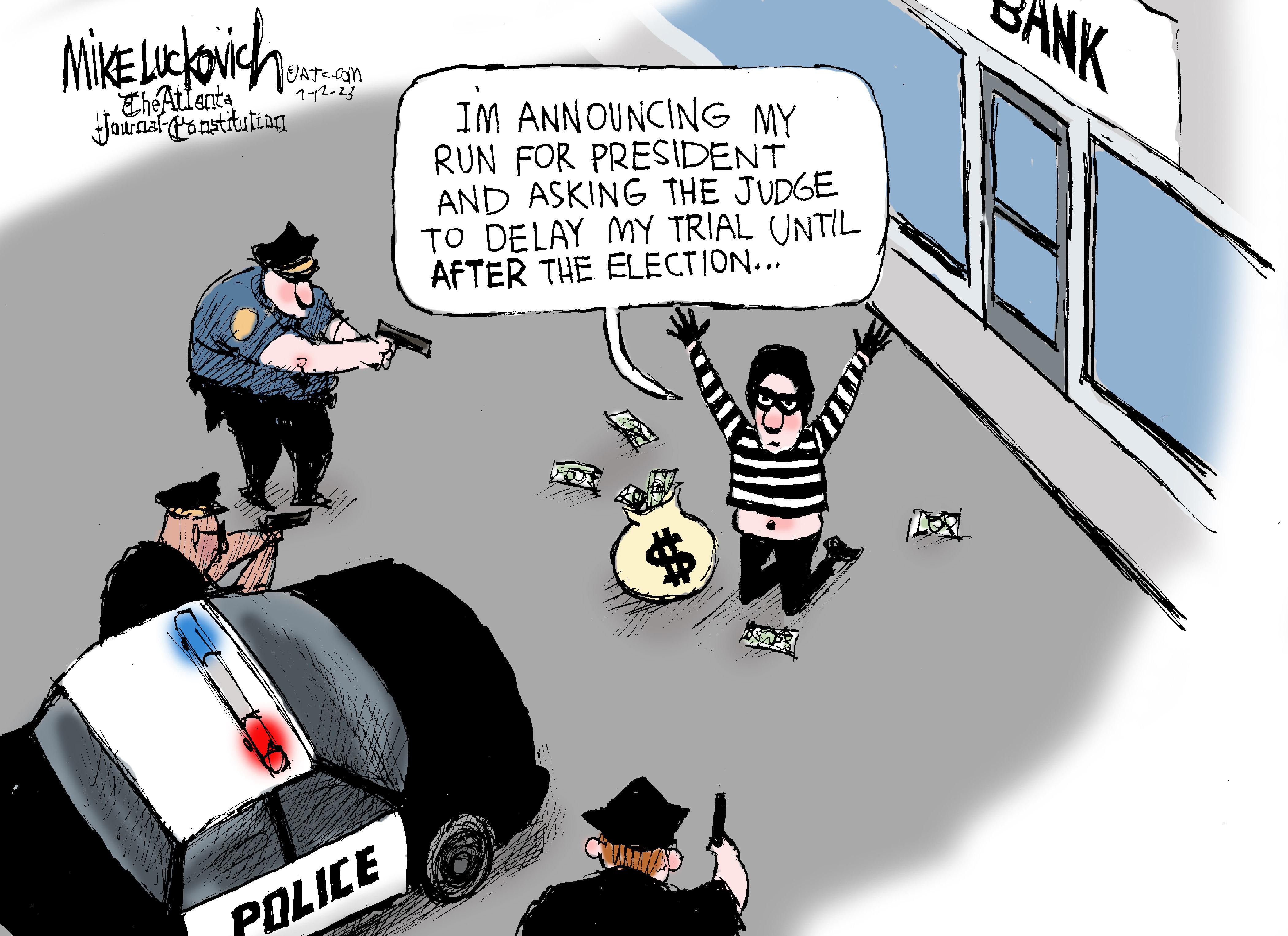It is not the fault of the FBI that Donald Trump surrounded himself with criminals.
- Rep. Ted Lieu (D-CA)
This week's featured posts are "This summer's weather is a turning point" and "DoJ, the FBI, and the Biden-crime-family conspiracy theory".
This week everybody was talking about the weather

That's the subject of one featured post. Short version: When climate-related disasters happen one at a time, they're easy to deny: "We've always had floods" or heat waves or hurricanes or whatever. But when several apocalyptic weather events are happening at the same time, it feels qualitatively different. Those of us who care about the future need to jump on this moment. The debate over the existence and seriousness of climate change needs to be over.
and politicizing the NDAA
In 1948, the Senate paved the way for Democratic President Truman to negotiate the treaty that formed NATO by passing the Vandenberg Resolution, named for the Republican Senator who chaired the Foreign Relations Committee, Arthur Vandenberg. At that time, Vandenberg said something that has been quoted many times since: "Politics stops at the water's edge."
In other words: Republicans and Democrats might have their partisan struggles, but when it came to defending the country, all that would be put aside. That sentiment has always been more of an aspiration than a hard-and-fast principle, but it was never blatantly rejected until this week, when House Republicans loaded up the annual National Defense Authorization Act (which has to pass if our troops are going to be funded in FY2024, which starts in October) with a long list of culture-war provisions that Democrats in the Senate are bound to reject.
Rep Jeff Jackson (D-NC) explains how this process is supposed to work, and how it actually worked this year within the Armed Services Committee: There's a behind-the-scenes negotiation to draft a bill that can get broad bipartisan support, and then on the final day the committee has to vote on hundreds of proposed amendments.
On this day, the chair of the committee has a very specific job: It’s to say no to his own party.
Why? Because he knows that some of the amendments his party is proposing are absolute deal-breakers for the minority party and he wants a big bipartisan vote out of committee to give the bill the best chance when it reaches the whole House.
Honestly, he did a pretty good job of knocking away the real grenades that would have blown up the whole thing. He definitely knew what he was doing. He let in just enough of the culture war stuff to satisfy his party without going that step too far that could have sunk it.
So Jackson, a Democrat, praised Chairman Mike Rogers, a Republican, for putting national defense above scoring political points. And while that bill would ban the Pentagon from funding drag shows, along with a few other culture-war provisions of little practical significance, it got out of the committee on a 58-1 vote.
Unfortunately, the bill then went to the House floor, where Speaker McCarthy could not stand up to his party's radicals. Several amendments passed on party-line votes, turning the NDAA into a culture-war messaging vehicle that will make it much harder for servicewomen (or spouses of people in the armed forces) to get abortions, will eliminate the Pentagon's office of diversity, equity and inclusion, and end coverage for transgender health care. As a result, the NDAA itself became a near-party-line vote, passing the House 219-210.
Now the Senate will undoubtedly pass a very different bill, setting up a showdown closer to the new-fiscal-year deadline of October 1. In that debate, the defense of the country and its global interests will take a back seat to domestic politics.
Another example of Republicans prioritizing culture wars over national defense is Senator Tuberville's one-man blockade on military promotions. Ordinarily, promotions pass the Senate en masse by unanimous consent, a process that avoids highly time-consuming votes on individual officers. But Tuberville's objection makes that impossible, and the result is that the Marine Corps has only an "acting" commandant. Soon several of the Joint Chiefs will need to be replaced as well.
As with the House NDAA vote above, his issue is abortion.
and conspiracy theories about DoJ and the FBI
That's the topic of another featured post.
A related story that I didn't mention there: The saga of Gal Luft, who was supposed to be the House Oversight Committee's star witness against the Bidens. But he went "missing" before he could testify. And then it turned out that he was on the run from an indictment filed in November, before the GOP had even won control of the House, much less touted Luft for a starring role in their hearings.
He faces eight separate counts, including two charges of making false statements to federal officials, one for conspiracy to violate the Foreign Agents Registration Act, and five counts relating to separate schemes which allegedly involved Luft trying to trade in sanctioned Iranian oil and broker deals for a Chinese firm to supply, among other things, “strike UAVs” to Kenya and anti-tank missile launchers to Libya.
He's been found and is currently under arrest.
and the Hollywood strike

Most of us aren't used to thinking of actors or TV/movie writers as workers. We imagine them living lives we can only dream of. And for some of them -- though far from the majority -- that's true.
So when the Writers' Guild of America went on strike May 2, and the Screen Actors' Guild followed on Wednesday, most of the world's truck drivers, waitresses, and assembly-line workers probably didn't feel much instinctive solidarity.
However, there's a lot to sympathize with here. The issue is a new technology (artificial intelligence) that has the potential to make entire professions obsolete. And the question is: Who's going to profit from that technology? The dispute parallels issues that played out during the Industrial Revolution centuries ago. Things came out badly for skilled workers then, and it would be a shame if those mistakes got repeated.
One of the myths I was taught about industrialization is that it mechanized repetitive low-skill jobs and created more high-skill jobs. The economist Harry Braverman exploded that myth in his 1974 classic Labor and Monopoly Capital: the degradation of work in the 20th century. In Braverman's retelling, it was precisely skilled labor that got replaced: weavers, bakers, blacksmiths, cobblers, and craftsmen of all sorts. Their specialized knowledge got designed into machines whose repetitive operations could be overseen by comparatively unskilled workers.
Most of the craftworkers got nothing for their knowledge. A few skilled workers would be observed closely by engineers. When the skills it had taken them years to master had been captured in a machine, they were no longer necessary -- and neither were any of their guildsmen. The resulting profits went to the industrialists who owned the machines.
Artificial intelligence could soon do something similar to writers and actors. AI could digest, say, all the romantic comedy scripts ever written (with no payment to their authors), and then be able to fulfill requests like "Write me a rom-com set in Singapore with a rich woman fresh from a messy divorce and an airline pilot." Another AI might take body-scans of a few real people (maybe they'd be paid for a single day of "labor") and create a movie in which those "actors" perform the rom-com script.
The possible profits are immense, and they would all go to the companies that own the AIs.
At the press conference announcing the strike, National Executive Director and Chief Negotiator Duncan Crabtree-Ireland said that the [American Motion Picture and Television Producers]’s proposal for AI “proposed that our background actors should be able to be scanned, get paid for one day’s pay, and their company should own that scan, their image, their likeness and to be able to use it for the rest of eternity in any project they want with no consent and no compensation.”
People trying to break into the creative professions are often desperate and correspondingly ripe for exploitation. One famous example is the comic-book duo of Jerry Siegel and Joe Schuster, who sold the rights to their new Superman character for $130 in 1938.
and Trump's next indictments
Fulton County District Attorney Fani Willis swore in two new grand juries this week. Georgia grand juries serve for two months. Many of her previous statements indicate that this is the cycle when she will seek to indict Trump for his efforts to interfere in Georgia's 2020 election.
Jack Smith is investigating many of the same crimes -- the fake elector scheme, pressuring election officials (all the way up to VP Mike Pence) to change or throw out the election results -- in Georgia as well as other states Trump lost, in addition to his role in inciting the January 6 insurrection. Lots of former federal prosecutors have been speculating that Smith will want to get his own indictment out ahead of Willis.
So we're on indictment watch again: The Georgia indictment is expected early next month, and Smith could file any day.
In some sense, this would be the "real" indictment. Trump's constant law-breaking has created a public expectation that ordinary laws don't apply to him, so the filing-false-business-records charges in New York and the federal stealing-classified-documents charges feel illegitimate even to some people who aren't part of his personality cult. Those are real laws frequently used against other people, and he's clearly guilty in both cases. Even in my eyes, though, those charges resemble nailing Al Capone for tax evasion rather than the St. Valentine's Day Massacre.
But if I had to pick one reason why I want to see Trump in jail rather than back in the White House, it's that he tried to stay in power after he lost the 2020 election. That's the greatest breach of faith committed by any president in American history, and it's the crime he deserves to be judged on.
If you're wondering what such an indictment might look like, Just Security has a written a "pros memo" based on the evidence that is publicly available. Such memos are typically written by the DoJ (and kept confidential) prior to writing an indictment that will be available to the public. The full document is over 250 pages, but the introduction and executive summary together are just six.

Trump's lawyers filed for an indefinite delay in the Mar-a-Lago documents case, at least until after the 2024 election. Their filing argues that
there is simply no question any trial of this action during the pendency of a presidential election will impact both the outcome of that election and, importantly, the ability of the Defendants to obtain a fair trial.
Like Andrew Weissmann, I read this as a confession of guilt.
If you are innocent and want to be vindicated, you ask for a trial before the election. If you are guilty and want to run on victimization, without being undermined by facts and law, you don't.
Judge Aileen Cannon is supposed to hear arguments on the trial schedule tomorrow, and should set a trial date (or not) soon. That ruling will tell us a lot about how lenient she intends to be with Trump, who appointed her.
Another confession of guilt, in my view, is the lawsuit Trump filed asking the Georgia Supreme Court to quash the report of the special grand jury that investigated his attempt to steal Georgia's electoral votes in 2020. If he's indicted and a trial jury looks at the evidence against him, he's toast. So he has to get the evidence thrown out.
An innocent candidate would be demanding that all the evidence come out so that he could clear his name as quickly as possible. But all along, Trump's strategy has been to delay, block witnesses from testifying, and claim that there's nothing to see here.
and you also might be interested in ...
An appellate-court panel has temporarily set aside the crazy injunction a Trump-appointed judge made last week -- the one that barred large chunks of the Biden administration from discussing disinformation with social media companies. The order is short and doesn't explain the panel's reasoning, but promises an "expedited" hearing for oral arguments.
The Netanyahu government has revived its plan to reduce the independence of the judicial branch, and so protests are starting up again. What could possibly go wrong with a plan to give more power over the courts to a leader facing indictment?
Turkey has dropped its opposition to Sweden joining NATO, so that might happen soon. The other prospective new member, Finland, officially joined in April.
And that makes me shake my head at this poll result:
52 percent of MAGA-identifying Republicans believe Russia’s Vladimir Putin is a better president than Joe Biden.
Because Putin is doing such a great job of achieving his goals, I suppose.

A Texas judge is arguing that the Supreme Court's recent ruling in the 303 Creative case should mean that she doesn't have to marry same-sex couples.
If I asked you to think of some horrible example of gun violence, probably you'd name a school shooting: Uvalde, Sandy Hook -- something like that.
But a report in Thursday's IndyStar calls attention to another kind of shooting that is horrible in a different way: family annihilations, where some guy (men do 94% of family annihilations) wipes out his whole family, usually with a gun, and often (64%) finishes by committing suicide.
There are way more of these than I had ever imagined: 227 in the US since 2020. Texas has the most,
But it's happening across the U.S., and the number is going up by the year. There were 62 cases in 2020, 61 in 2021, and 72 in 2022. There already were at least 32 in 2023 through the end of April, a pace that could lead to nearly 100 incidents this year. ...
The U.S. has three times more family annihilations than Canada, eight times more than Great Britain and 15 times more than Australia, according to The National Institute of Justice. ...
A USA TODAY investigation found American children are three times more likely to be shot at home than at school — and the majority of perpetrators are their parents or guardians.
The IndyStar article shifts back and forth between a general description of the problem and an in-depth account of a specific case: 61-year-old Jeffrey Mumper of Bloomington, Indiana killed his wife and two children (pictured below), before killing himself in September, 2020.

If you're considering supporting RFK Jr. for president, you should watch this video, where he seriously discusses the possibility that the Covid virus was "targeted to attack Caucasians and Black people" while "the people who are most immune are Ashkenazi Jews and the Chinese".
After that clip went viral and accusations of antisemitism poured in, Kennedy tweeted a clarification, which also turned out to be bogus.
Kennedy perfectly illustrates a quote I have never been able to track to its source, but I'm sure I didn't think of it myself: "Anybody who believes crazy things will eventually believe crazy things about Jews."

In Friday's NYT, a federal district judge wonders what ever happened to the Supreme Court's sense of smell. He recounts the kinds of ethical issues that have popped up in his own career: a lawyer has Red Sox tickets he's not going to use, a man he had awarded disability benefits comes to his office to give him a hand-carved pencil box in gratitude. Neither offer, he believed, was being made with bad intentions. But he turned them down, because
You don’t just stay inside the lines; you stay well inside the lines. This is not a matter of politics or judicial philosophy. It is ethics in the trenches.
He is disturbed that Supreme Court justices seem not to understand this. You turn gifts and favors down not because you can't find a loophole in the law big enough to squeeze them through, but because they smell bad, and they undermine public faith in the fairness of the judiciary.
While we're on the topic: Justice Sotomayor's taxpayer-funded staff helping promote her books also smells bad. I don't think this is on the same scale as Clarence Thomas' corruption, but that doesn't mean I have to defend it. The Supreme Court needs an enforceable ethics code that applies to everybody. That idea ought to have bipartisan support. But sadly, it doesn't.
George Lakoff (the guy who popularized the notion of "framing" back in the 1990s) gives advice on responding to trolls on social media: Don't do it. Do this instead.
If you don’t wish to amplify trolls, don’t respond to their posts. Instead, try posting your own proactive message. If you see a post spreading false information about vaccines, you could do your own post that says: “I’ve noticed posts containing false information about vaccine safety. I won’t take the bait by responding, but here are the facts…” Then deliver whatever message you were planning to write as a response to the troll, even if it’s just a link to a news story debunking whatever the troll is saying.
This is how far gone the Right is these days. At the Turning Point USA conference in Florida yesterday, MTG "attacked" President Biden with a long comparison to transformational presidents LBJ (who got Medicare and Medicaid passed) and FDR (Social Security), concluding with this:
LBJ had the Great Society, but Joe Biden had Build Back Better (and he still is working on it): the largest public investment in social infrastructure and environmental programs that is actually finishing what FDR started, then LBJ expanded on, and Joe Biden is attempting to complete.
Democratic Congressman Ted Lieu responds: "Thank you, @RepMTG. More of this, please."
I have no special animus towards Tom Cruise, and in general I love action movies, but his action-movie series will never be Mission: Impossible to me. The original MI TV series was the polar opposite of a star vehicle: The plan was the star, and it was carried out each week by a rotating collection of perfectly chosen agents with extraordinary-but-not-superhuman abilities.
While I'm on the subject, here's something I just learned this week: One of the best things about the MI franchise is the catchy beat of its theme song. If you read that beat as Morse code, it's dash-dash, dot-dot, dash-dash, dot-dot. In other words: MI, MI, MI ...
A related point: Cruise will also never be Jack Reacher for me. In the Lee Child novels, Reacher is 6'5", and the first thing people notice about him is how physically imposing he is. Alan Ritchson, who plays the role in Amazon's Reacher series, is a much better choice.
and let's close with something cosmic
The James Webb space telescope turned 1 this week. To celebrate, I'll share this image of the Rho Ophiuchi cloud complex, the closest star-forming region to Earth.

No comments:
Post a Comment